Landscape of Freckles
– Nonfiction by Laura Sergeant –
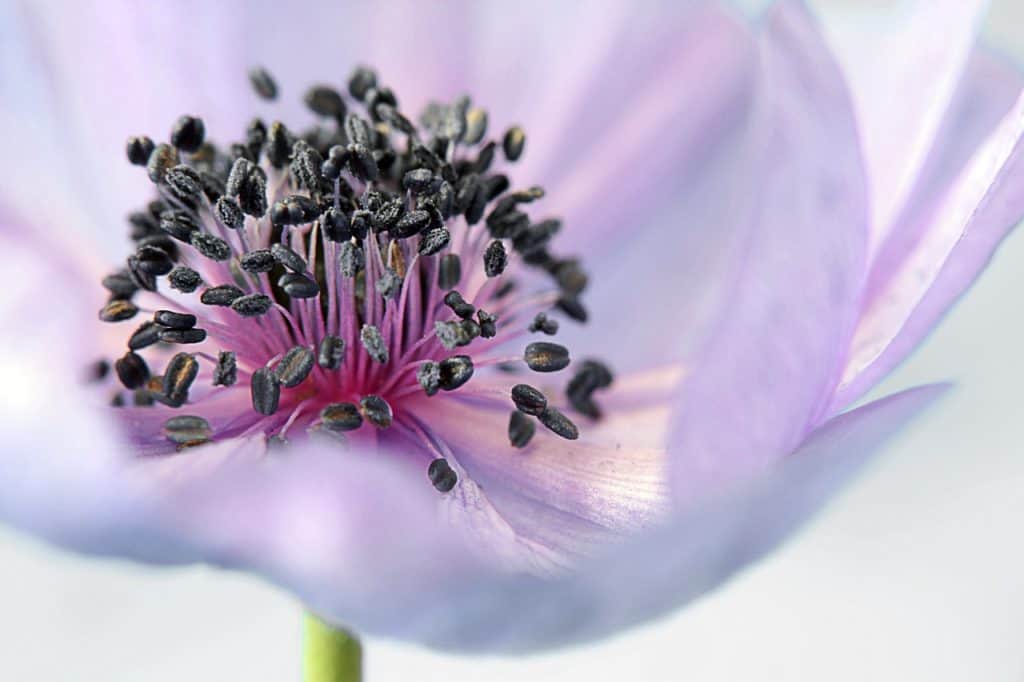
I am borne of a landscape of freckles. My mother, her father, his mother: the Williams and Shepherds, the English and Welsh. The bounty of peach farms, peace roses and quiet spirituality. I inhabit their bodies when my knees are in the soft lawn and I’m chasing weeds with my muddy fingers inside cracked gardening gloves. Heat sits still and streaks my face with rivulets I can only catch with a soft cotton shoulder. Memory comes unbidden in these movements: On your driveway amid the brown paper leaf bags, wheelbarrow, loppers and broom, you wipe your forehead with your upper arm and wave as I pull toward the house.
Now, your inherited tools rest against my ancient maple tree and you float through the June evening whispering instructions. Plants gulp the red buckets of water I pour into dark carved moats. Hard pruning – I hack out plants by thirds, the ratio you taught me. I make assertive cuts, following middle branches right to the centre of the tree: light and air. I weed like Sisyphus while my neighbours entertain. Their party drifts through fence slats: sentence shards that break in laughter; cigar gusts; beer caps hiss; Miles Davis swims toward me. My tasks have urgency tonight: in two days 800 ticket holders will traipse through my yard for the “Grand Durand Garden tour.” Held in three-year intervals, it features ten homes from my leafy heritage neighbourhood of stone castles and Victorian cottages. To be chosen feels like a coronation. Somehow I’ve become a gardener, an identity I never expected.
***
“Hey!” she bounds down the sidewalk with a broad smile and arm thrust high, posture erect. Even at a near run, she doesn’t lean forward. She chases her voice down the street, trying to close the gap between sound and target.
I try to look nonchalant as I speed shuffle up the walk from my car to the front door. Self-reproach doesn’t stop my unfriendly performance. I maintain a charade of casual deafness. Alice intuitively accelerates.
“Lauren!”
She’ll get my name wrong for nearly ten years.
“Yoo Hoo, Lauren!”
Her opinion precedes her like a spray-bomb of pesticide dust. She’s out to exterminate anything ugly on our street.
Crap. I didn’t make it into the house.
Farm-girl sturdy, tanned, she’s now vibrating inches in front of me. I can’t wriggle from her penetrating gaze, firm as a handshake. Her vigour shrouds my ability to peg her age. Gardeners develop strong aesthetic preferences. Not all gardeners share them. She’s as blunt as her salt and pepper bob.
“Oh, hey Alice, It’s Laur-“
She cuts me off, enthused: “Hey, your yard is coming along.” Words tumble in a gush of approval. “Those hellebores are gorgeous.”
She uses scientific names. A close talker. Conspiratorial. I’ve braced myself. Here it comes.
“Listen. You should cut back the cotoneaster, it’s looking messy. It’s much too high. And look, here – this is just dead.”
She’s lifting the offensive branch. “It’s brown. You need to cut out all the dead branches.”
I’m always struck mute by intensity and evaluation.
Half-cackle. “Oh. Boy! I’d take that out.” She’s pointing at a straggly sand cherry shrub. “It doesn’t owe you anything does it?” Her smile doesn’t waver. It’s an instruction tucked into the cadence of a question.
Jeepers. How to answer that? No? Yes? I respond to her authority and feel graded, learning later she’s a retired high school gym teacher. She must feel naked without a whistle to signal infractions. Owning this home on a street of seasoned gardeners will be a public exercise in being a novice. A vulnerability I’d rather avoid. Despite the refurbished front bed, as Alice talks, I’m certain the secrets of my inexperience rest at my feet in spent blooms. My shameful trail of dead violets, peace lilies dried to powder over neglectful office holidays, amber bamboo shoots, a bean plant’s tendrils toppling my styrofoam cup off a ledge. I’ve never kept a plant alive. I can’t let Alice know what’s happened in the backyard. Without discernment, I’ve ripped out spindly green weeds before they could reveal themselves to be flowers and mishandled poison ivy to an extent that required steroids to heal.
Just weeks before, my mom had taken me by the scruff of the neck over the phone, “Laura-bye, let’s go to the nursery and get some things for your front bed.” I can plant things now; I have a yard! I’m waking from callow slumber. I sit in my car for long minutes after arriving home from work and stare in wonder. I can’t believe I own a house. A beautiful brick-orange Victorian, with stain-glass eyelids, that I loved and lived in as a tenant for years. Potted perennials are unloaded from our cars. My mom’s astride my flagstone walk indifferent to the small audience of neighbours. Steve and Tracey are on their porch swing; Veronica’s under a cloud of thoughtful smoke; Carrie is unloading groceries and says “Hi.” I’m mortified to be a beginner, publicly instructed by my mom.
She makes a snake of the dark purple plants; ah, the design comes before digging. This curved thread of colour will lead the eye toward the house. A front door I just painted aubergine. Careful instructions for transplanting from container to earth. She stands back and encourages my halting effort; it allows me to embed these movements into motor memory. We lop a euonymus to create the illusion of an asymmetric berm. Generous with her enthusiasm: “Oh your soil is wonderful; you’re so lucky not to have clay! Aren’t those variegated leaves pretty!” I feel a flush of pride and rest in the familiar comfort of my mom’s praise. The fruit of that afternoon was visible in striking plum foliage and unseen in a kernel of bright excitement about gardening. She helped plant them both.
***
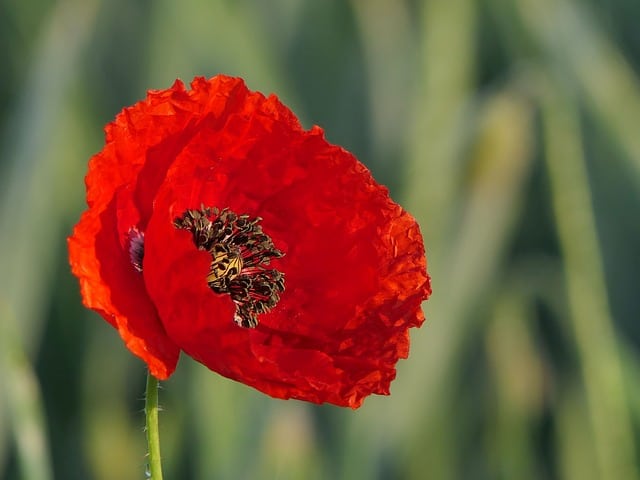
Captured in matching sundresses holding hands, my mom and I are beaming at the camera, posing by the side garden of my childhood home. A heat trap of brown brick collects hot western sun. I wasn’t taller than the flowers: peonies, poppies, black-eyed susans, drifts of bee balm, cosmos and lilies. I had a faded plastic watering can for helping but my astonishment was not with flowers. It was saved for trees I could climb, a rambling ruby-twigged dogwood shrub that was my dirt-floored summer home, grass tips that tickled my feet, sticky dandelion bracelets and raspberries to pick.
It was a practical, physical communion.
Thirty years later and I’ve returned to live in that same childhood home, tending to the gardens while my mom lives overseas. I can’t call it an apprenticeship. I’m a city mouse dropped back in the suburbs. I watch the neighbours for clues. I cut the lawn on the same day as Mr. Suenaga. He must know what he’s doing. My mom attempts to email gardening instructions; but she’s still afraid of her computer. She’s unnecessarily brief, still teaching herself to hunt and peck on a keyboard and worried an errant keystroke could destroy her laptop. I receive instructions with complete bewilderment. We switch to phone calls. With the curly phone cord pulled taut, I can peer out the kitchen window into her backyard.
“Is that the yellow stuff beside the Suenaga’s?”
“Yes. It’s forsythia, vase-shaped. I try to prune it early when you can still see the structure. The bare branches. Oh dear, sounds like it’s already bloomed.”
“So what else then?”
“The bridle wreath spirea will need pruning; it has white lacy flowers”.
“Is that the one that looks like a poodle?”
“Where?”
“By the deck. Kind of ugly, like pom-poms”
“No, no, that’s viburnum. You think that’s ugly? Oh, Laura, that’s fragrant viburnum. You should just smell it. It’s heavenly – spicy.”
“Mmm-kay.”
“Are you concentrating? This call is costing us a fortune. The spirea is in front of the Bell box.”
“I don’t see anything white. It’s just green.”
“Maybe it hasn’t started flowering yet. Do you remember seeing blooms?”
I don’t. I don’t have the right lens to apprehend her yard. A garden holds visual language I don’t read. My recognition of pretty things is reflexive and dull; I’m not particularly captivated. “That’s nice,” I might murmur at something while my mind is on my next workout or desert island album list. That summer, she comes home to a horribly overgrown yard. “Laura! It’s a jungle! Did you do anything?” Mild upbraiding; I was timid with her pruners, frightened I would hurt the plants.
***
My dreaming starts in March. My cherubs emerge from the white lake they’ve floated beneath, their heads crest like swimmers, followed by small shoulders. Stone figures revealed, kneeling on muddy garden beds choked with frosted leaf mulch beside the sallow lawn. Yard groaning as it wakes. Botanical language starts returning to me: all winter the words are unreachable, frozen, locked in my unconscious. Filthy March sidewalks have ended their hibernation. Lingering ashen snow piles are flecked with charcoal – crusted and stubborn. They collapse to release sodden receipts, soda cans, spent cups and beer caps. Everything needs sweeping.
The sky doesn’t impress me yet. Despite the lengthening days and shifts in the quality of light, its blue seems tepid as if smeared with white remnants of winter. Although the miserable sun is too thin to thaw the ground or release me from my parka, there are portents. Dormant bird songs insistent in their awakening. Robins’ fat rusted bibs. Dark swell of tree buds. An urge to pet the olive fuzz on low magnolia branches.
An urge to call my mom.
***
Lazy pink evenings I meet my mom at the local nursery. We drive from opposite ends of the city and park side by side in crunchy gravel. It’s early spring and we’re both dying to plant but we’re weeks ahead of the last killing frost. A repository for optimism and flirtation with impossible plant choices for our respective yards. Tom, the tree expert, wears a beaten straw hat, his face already raw with sun from a winter snorkelling trip in the Caribbean. Pruners in hand, he greets us with bear hugs as we officially open gardening season.
We follow his sure steps through the narrow-rowed forest of trees that rest on their enormous burlap root balls or in containers. Our “oohs” and “aahs” are involuntary as he points out his favourite specimens. I stop to touch the feathery Japanese maples, cherry-black beech leaves waxy as Christmas apples, demure lavender-tipped redbuds that withhold heart-shaped leaves and coral bracts that lipstick-stain a dogwood’s lateral branches. Cars whistle up the highway beyond the fence, but I don’t hear them. I’m ducking low branches and listening to foliage flap and imagining trees in my yard. I’m covetous and despair at trees already betrothed with red plastic “SOLD” ties. My greedy heart accelerates. I want everything – I fall in love over and over, row after row. Pricked by the reality of my narrow urban yard with a territorial eighty-year old maple tree; its thirsty roots and broad canopy force me to be selective.
I buy a triple-stemmed paper-bark maple: an understory tree with soft-lobed leaves akin to white oak. Despite the promise of scarlet in late autumn, the primary attraction is shaggy, exfoliating cinnamon bark. I catch myself standing in my garden bed, in odd positions, staring through the shimmery copper curls, translucent before dusk. The amber light transforms my yard; this sport of astonishment has been invisible to me for forty years, but no longer.
“Laura, stop! Look.” She can be bossy. “Darling, turn. No. There.” If necessary, she moves my head. It’s ridiculous and effective. “See how the light is coming from behind? Look at it through the leaves. Oh it’s marvelous!” The petals look lit from within. She savours the soft otherworldly hours before sunset. My mother’s favourite time of day has become mine.
***
I remember the landscape of freckles, moles and tiny crimson spots under my hand. Bedtime salves: I’m rubbing cream onto your back through the parting in your hospital gown. You remain a nurse through your dying. We are dodging bedsores and clots and secondary infections. We place sheepskin under cracked heels. Painstaking re-positioning. I’m facing what I can’t imagine: life without you. How do I let go of your familiar hands: their creases, freckles, dark spots and warmth? Edges keep falling away. Soft as your pillowy slack limbs that are holding fluid, cool to my touch while you complain of feeling hot. Your voice darkening with fatigue and discomfort. Your body becoming an inhospitable container.
There is the cresting, the fullness of spring. We watch the lime haze of the escarpment become crayon firm – a sherwood green outside your sunny hospital window. There is corporeal receding. You are in precarious bloom tethered to tubing – titrated fluids and medicine and attempts to excise disease. Every day the evidence mounts that life as you knew it, as we knew it, is not to be regained. The months of anticipatory grief find their final station. Your surgeon and oncologist both look forlorn sharing the CT results that day, the slivered images dark with menace. Tumours embedded and occluding the body’s pathways, advancing and throwing seeds too deep to retrieve.
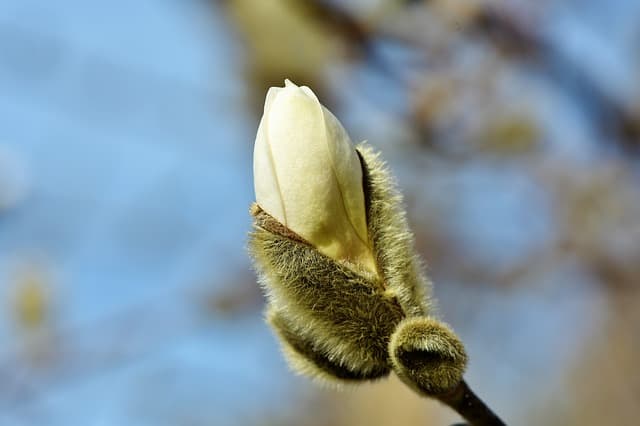
Two weeks before, on Mother’s Day, we hoped to take you home to your garden to visit your baby magnolia tree in butter yellow bloom. Just before departure, you become too unwell.
Whether symptoms or infection we don’t yet know, but the 2-hour window closes. Instead, we gather around your bed with gloved hands to share cards and flowers. Kids and grand-kids dressed in butter-yellow gowns and masks. Creamy cupped petals will drop unseen. You remain a gardener outside the garden: I spend an exasperating fifteen minutes afterward arranging your potted plants and fresh cut flowers on the hospital window sill under your exacting direction.
***
I have my grandpa’s rusty spade; the wooden handle has shrunk a little. It’s more ornamental than effective but it slices the dry crust of mulch and sinks into the ground below. I balance on it like a pogo stick to get purchase. Mixing the tar black new soil with the newly turned old soil as
I transplant. “Laura-bye, you don’t want to spoil the new plant, blend the soils.” Your voice embedded in bullet point instructions I follow like a recipe. The hydrangea falls out of the pot like a giant cupcake. The roots forced inward when they met the edges of a hard container. I gently loosen and untangle the tiny threads to give them a better chance in their new home. I’m replanting my garden when I’m not at the hospital.
The surgeon tells us you have less than two weeks to live. Your body like a clay pot you’ve outgrown. I’m playing with metaphor as I dig; clawing to understand. Are we all like root-bound perennials stuck in our bodies like ill-fitting containers? No consciousness of what lies beyond?
My hydrangea sat for weeks in a shady row at the nursery without awareness my yard existed.
I mix up the transplant fertilizer shaking my head at my limited theory. But then what else to believe? I kind of like the thought of spirit being transplanted to a wild place that can never be outgrown. If the doctor’s right, you’ll slip through a boundary beyond comprehension in days. Where are you going? How can I not know?
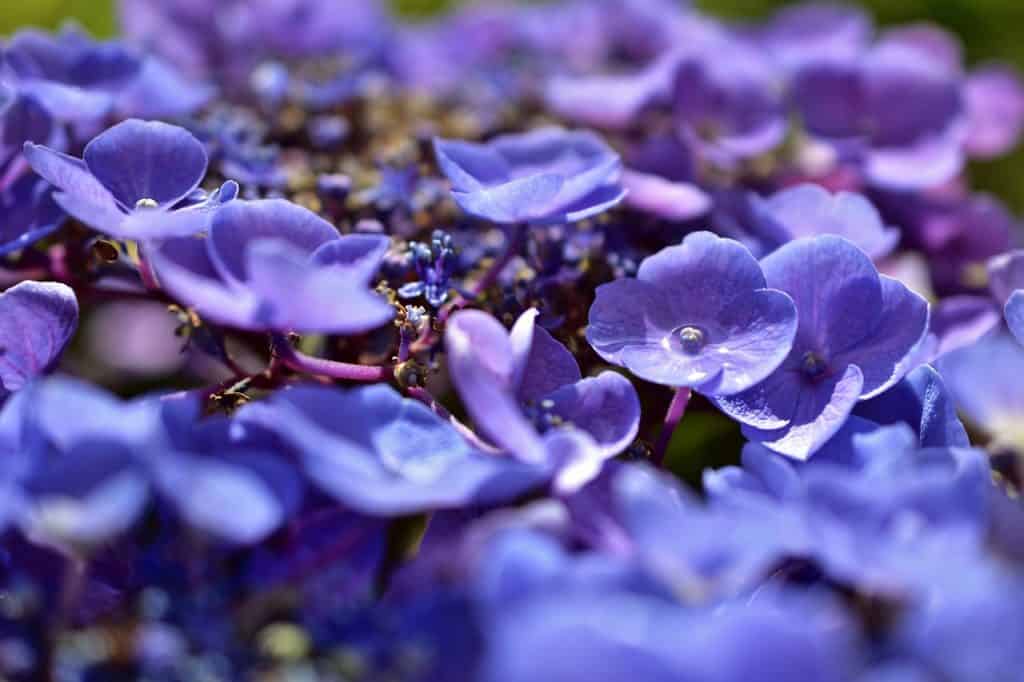
I’m replanting in a yard with beautiful bones, feeling staggered as I build back the soft-scape; layers of plantings you won’t ever see. I’ve been rehearsing for your absence even before you went to hospital, for the day you won’t park in front of the house or head to the back for a careful garden inspection, nodding as vigorously as your dad did touring your yard.
“Oh, look at your hydrangea! How do you get those blooms?”
“I don’t know, they seem happy in that spot.”
“Maybe mine gets too much sun. Did you prune them?”
“I didn’t this year, I was too scared.”
Together trying to figure out when the buds set; if blooms are on old or new growth; when and whether to prune. We share tips – you cut gardening columns from the paper and I send links online.
You alone have followed this unlikely garden story. You urged me to “go for it”; to create a plan with a landscape architect and to hire contractors to build it. That work, the hardscape, was finished in the fall while you were doing outpatient chemo. I’m flattered and say “yes” when Alice asks me to be on the Durand Garden tour. You and I never missed a tour: captivated – racing from house to house with our maps, taking pictures and gathering ideas. How can my house be on a tour that you won’t see?
A race and a prayer. This first spring, I’m desperate to share the garden’s progress; yet you’ve been in hospital since April. I bring you a short video on my tablet.
“Oh, that lattice, it’s going to be lovely when the snow falls. It will rest in those squares. You’ll just love it in the winter. The birds will nestle in there.
And look, are those shadows from the pergola? It’s marvelous.
Look what you’ve done! Darling, it’s beautiful.
And the lawn! Aren’t you just thrilled with it?”
You paint images of future beauty. In tandem, I plant for an unseen horizon. A garden you will never see. I want so badly for you to come and sit in the yard with me. To drink green tea. The yard was as much your dream for me as it was mine.
You tell me this is a good death. You don’t need to die at home. I’m shocked; that had always been your wish. The concerns of brick and mortar fall away. You are sparing energy and I imagine you feel safe here with the complexity of care well-managed. Your lens has narrowed over these last months. You’re at peace with travel destinations not seen. You’re at peace not returning to your garden, you intuitively address final gifts, whisper wisdom, read scripture and deliver instructions, as if organizing for a trip. You die in June, like dad. A darkening for me in the season of increased light. Buds break, twigs lime, damp garden beds swell while I feel sad. Its acute and discordant – I’m taken aback the way my body remembers grief. How spring-time is met in my cells with infinite longing.
***
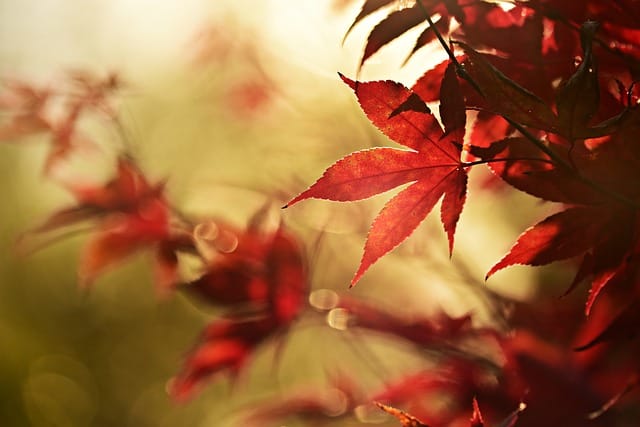
I face life without your wisdom. I would count on you to help me position trees or big shrubs. Lying on the ground, I would inch the root ball around in sundial increments, waiting for you to cry, “Stop! There.” Part of the task is to think toward the future and imagine where branches will arch as they grow; to size it up from all viewing angles.
I’ve bought a weeping Japanese maple, a memory tree, a gift from Alice and neighbours. I know where I’m going to plant it. I’ve ripped out the sand cherry after a stubborn ten years. The upcoming garden tour is motivation. I knock on Alice’s door to ask for help. She has exquisite taste and does your job to help position it, including the reassurance. I’m feeling inadequate as the tour looms. Anxious visions of imperious visitors speaking Latin and sniffing at anything as pedestrian as grass. Worried about what my garden isn’t. Forgetting what my garden is.
“Listen, people get it! If it rains, or there’s a frost – whatever – you’re all in the same boat! Oh it’s fun; it’ll be a great day. Gardeners are friendly. They’ll love your yard – you’ve got some real specimens! It’s a gardener’s garden!” She’s effusive and has enough confidence to borrow. We finish planting and I reflexively go to call you to tell you how nice it looks. Forgetting.
The day is flaming hot. I’m wearing a lanyard that says “Gardener,” my unlikely identity. It’s a full day of smiling. Alice is right. People are lovely and curious and bless my yard with compliments. All day, I wait for you, but you don’t come back.
To marvel at every inch. To walk the slate cobbles and wide welcoming steps toward the crown of fuscia, the limpid-tongued ferns and tangled whip cord cedars, the gasp of green lawn and clutch of creamy roses, and the mounds of mascara-dark mulch.
You don’t come back.
To grin proudly, arm tight around my shoulder: “This is my daughter – isn’t her yard gorgeous?” One extra squeeze on one June afternoon: breath-taking and transient, like love. Like you and I.
It’s your delight I imagine alongside my own.
You don’t come back.
Who am I without your reflectance? Can I be a gardener? I see now, I am a gardener. Not because my yard is lovely. Not because I know how to keep things alive. I don’t define gardening by outcomes. Crops fail. I work to accept the radical blows of nature. I’m not a gardener because I love the balm of simple garden chores and physical stewardship. I will remain a gardener even when I’m without property or living blooms; even when I’m frail, arthritic and unable to tend growth. I’m a gardener because I’ve been gifted with the lens of astonishment: to see divinity and poetry. I see with the eyes of my mother, her father and his mother before him.
About the Author – Laura Sergeant

Laura Sergeant is a paediatric social worker who specializes in child and youth mental health. She previously focused on poetry and songwriting: she played guitar for several indie bands during her twenties. She has been published in the Globe and Mail, as runner-up in the 2018 Grit Lit Contest and was a finalist for the Iceland Writers Retreat Writing Competition. Most days she unwinds in her garden or by exploring Hamilton, Ontario’s burgeoning coffee scene. Mortality and CBC (Canadian public radio) podcasts will prevent her from getting through her “must read” book list. She is currently working on a collection of life stories.
Did you like this nonfiction story by Laura Sergeant? Then you might also like “Hank.” Or, checkout the following:
To check out all the nonfiction available on Dreamers, like this piece by Laura Sergeant, visit our nonfiction section.
Like reading print publications? Consider subscribing to the Dreamers Magazine!